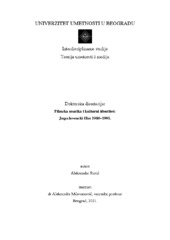| dc.contributor.advisor | Milovanović, Aleksandra | |
| dc.contributor.other | Ćirić, Marija | |
| dc.contributor.other | Daković, Nevena | |
| dc.contributor.other | Popović Mlađenović, Tijana | |
| dc.contributor.other | Janković, Aleksandar | |
| dc.creator | Ristić, Aleksandar | |
| dc.date.accessioned | 2021-04-15T09:50:36Z | |
| dc.date.available | 2021-04-15T09:50:36Z | |
| dc.date.issued | 2021-06-24 | |
| dc.date.submitted | 2020-04-10 | |
| dc.identifier.uri | http://eteze.arts.bg.ac.rs/handle/123456789/509 | |
| dc.description.abstract | Sistematizacija i analiza jugoslovenske filmske muzike u periodu od 1980. do 1991. godine, uspostavljena u korelaciji sa novim talasom (filmskim i muzičkim), a u funkciji kreiranja novog i drugačijeg kulturnog i društvenog identiteta, centralni je istraživački predmet ovog rada. Njegov prvi cilj usmeren je ka dijahronijskom i retrospektivnom posmatranju filmske muzike. Kroz drugi, uočeni su i definisani najvažniji stilski, žanrovski i semiotički aspekti filmske muzike, a zatim je analiziran i njen filmsko/muzički uticaj u procesu filmskog pripovedanja. Najzad, treći, ujedno glavni cilj ovog rada, usmeren je ka istraživanju uticaja filma i muzičkog novog talasa u kreiranju kulturnog identiteta u Jugoslaviji (SFRJ). Posebno se razmatra jugoslovenski novi talas kao kulturološki fenomen koji se (primetno u društvu i umetnosti) javlja u trenutku smanjenog uticaja socijalističke doktrine i (delimično kontrolisanog) identiteta, a kao jugoslovenska refleksija (započeta šezdesetih, a dovršena osamdesetih godina) na društvena, kulturna i muzička dešavanja u Velikoj Britaniji i Sjedinjenim Američkim Državama. Glavna hipoteza ove studije zasnovana je na teorijskoj pretpostavci da je u jugoslovenskoj filmskoj muzici proces infiltracije popularne muzike i popularnog songa u pripovednu strukturu filma kulminirao tokom osamdesetih godina dvadesetog veka, čime se problematizuje umreženost kulturnog i društvenog uticaja u konstrukciji i dekonstrukciji kulturnog identiteta u SFRJ. Otuda se prvostepeno popularni song prati kroz njegov nastanak, razvoj i mesto u filmskoj dijegezi, a drugostepeno kao deo opšteg kulturnog trenda koji filmski autori prihvataju i primenjuju u okviru svojih dela. Da bi došao do pretpostavljenog ishoda analize, ovaj polazi od teorijske periodizacije muzike u filmu koja prelazi u analizu filmske muzike i popularnog songa (dijegetičkog i nedijegetičkog, songa koji je potekao iz filma i postao popularan ili je kao popularna numera funkcionalno prilagođen filmskom pripovedanju). Zatim se kreće ka otkrivanju sveobuhvatnog simboličkog delovanja vizuelno/muzičkog teksta u filmu, da bi modelom postepenog širenja analitičke optike i teorijskog opsega promišljanja, tema uticaja filmske muzike i popularnog songa prevazišla zadati istorijsko-razvojni okvir, potcrtavajući njihov značaj za specifičnosti kulturnog identiteta u jugoslovenskom društvu. | en |
| dc.description.abstract | Systematization and analysis of Yugoslav film music in the period from 1980 to 1991, established in correlation with the New Wave (film and music), and in the function of creating a new and different cultural and social identity, is the central research subject of this thesis. Its first goal is directed towards the diachronic and retrospective observation of film music. Through the second goal, the most important stylistic, genre, and semiotic aspects of film music are identified and defined, and then its film/musical influence in the process of film storytelling is analyzed. Finally, the third and main goal of this thesis is aimed at researching the influence of film and New Wave music on the creation of cultural identity in Yugoslavia (SFRY). The Yugoslav New Wave is particularly discussed as a cultural phenomenon that (noticeably in society and art) occurs at a time of reduced influence of socialist doctrine and (partially controlled) identity, and as a Yugoslav reflection (which started in the sixties and was completed in the eighties) on social, cultural and musical events in the UK and the United States. The main hypothesis of this study is based on the theoretical assumption that in Yugoslav film music the process of infiltration of popular music and popular song into film narrative structure culminated during the 1980s, which problematizes the networking of cultural and social influence in the constructions and deconstructions of cultural identity. Hence, the popular song is primarily followed through its origin, development, and place in film diegesis, and secondarily as part of the general cultural trend that film authors accept and apply within their works. In order to arrive at the assumed outcome of the analysis, this thesis starts from the theoretical periodization of music in film, which turns into an analysis of film music and popular song (diegetic and non-diegetic, song that originated from film and became popular or is functionally adapted to film narration). It then moves towards discovering the all-encompassing symbolic effect of visual/musical text in film, so that, through the model of gradual expansion of analytical optics and theoretical scope of discussion, the theme of the influence of film music and popular song exceeds the given historical-developmental framework, emphasizing their importance for the specifics of cultural identity in Yugoslav society. | en |
| dc.language.iso | sc | en |
| dc.publisher | Универзитет уметности у Београду, Интердисциплинарне студије Универзитета уметности | sr |
| dc.source | Интердисциплинарне студије Универзитета уметности | sr |
| dc.subject | filmska muzika, popularni song, kulturni identitet, jugoslovenska kinematografija, novi talas, filmsko/muzički uticaj, kulturni obrazac | en |
| dc.subject | film music, popular song, cultural identity, Yugoslav cinematography, New Wave, film / music influence, cultural pattern | en |
| dc.title | Filmska muzika i kulturni identitet: Jugoslovenski film 1980‒1991. | en |
| dc.type | doctoralThesis | en |
| dcterms.abstract | Миловановић, Aлександра; Ћирић, Марија; Поповић Млађеновић, Тијана; Јанковић, Aлександар; Даковић, Невена; Ристић, Aлександар; | |


